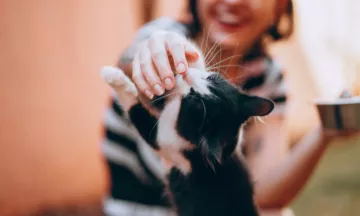Some dogs tend to be super flatulent and, frankly, a bit stinky. We may giggle about this, but it is important to keep an eye out if your dog has a sudden increase in stinky farts. Why does a dog fart and can we do something about it?
Why does my dog fart?
A fart is nothing more than gas that is released during the food digestion process which eventually leaves the body. We all know it happens to us humans, but it can also happen to our dogs. We often don't even notice when a dog does this because they generally don't smell, but on occasion, a dog may suddenly (and noticeably) fart more often and with smellier results. This can have various causes, so it's important to check why your dog is suddenly so gassy.

1. Poor nutrition
With a healthy balanced diet, a dog shouldn't really fart all that much. But food with a lower nutritional value and 'fillers' (such as grains) will be more difficult for your dog to digest. This can lead to extra gas formation, which eventually leads to more smelly farts. Therefore, be sure to feed your pooch a healthy, balanced diet. That can be high-quality (organic) dry food but also fresh raw meat. Wet food from cans often contains a lot of additives and a lower nutritional value, so it's better to avoid that.
Not all dogs like raw meat and not every dog can tolerate it, whereas other dogs LOVE IT. Every pooch is different, so take time to plan the best diet you can for your individual dog.
Furthermore, your dog can get gassy from food found on the ground during a walk, scraps from the bin or leftovers from the table. Food for humans is often too fat, salty or contains too much sugar, starch or grains for dogs. So give your pooch proper dog food and keep the human food well out of reach.
2. Change in diet
A sudden change in diet can also cause flatulence. When introducing new food to your dog, always ensure a slow transition: first mix a little bit of the new food with the old food and increase it gradually.
3. Food allergy
Some dogs may be allergic or intolerant to a particular type of food, which means they can't adequately digest certain types of protein (such as chicken, grain or milk protein). These foods can upset your dog's intestines, resulting in cramps and flatulence. Often a food allergy or intolerance is accompanied by other complaints such as itching and skin infections. Your veterinarian can help you exclude a food allergy with an elimination diet, but always be sure to do this with your vet's help.
4. Eating too fast
If your dog gobbles down their dinner too fast, they will also gulp down extra air which causes bloating and some stinky gas. A slow-feeder bowl can help with this, but also giving your dog smaller portions may do the trick. You can also hand-feed your dog or use food puzzles. Also, make sure your dog can eat in a quiet environment and prevent several dogs from eating together: often they will start a competition to see who is the first to finish.
5. Old age and illness
If your dog farts often and is very stinky, this can also indicate health problems such as an infection or a gut parasite. Older dogs often have more difficulty with digestion, which means they fart more. If you notice a change, such as your dog farting more often or smelling worse, always consult a veterinarian.
To check extra if your dog's farts are normal, it is always important to also keep an eye on their toilet habits. A healthy dog should poop daily, and their stools should be firm enough to collect in your poop bags during their regular walk. Has this changed recently, for example, into soft or really smelly faeces? Then something can be wrong. Yep, it's a dirty job, but your dog's poop is actually a very clear indicator of the state of their health. Read more about your dog's poo.
Bonus tip: Exercise for your dog
Overall health improves the bowel function of your dog, and sufficient physical exercise actually prevents cramps and flatulence. Are you short in time to walk, run or play with your dog? Then book a friendly Pawshake dog walker for a personal dog walking service.





